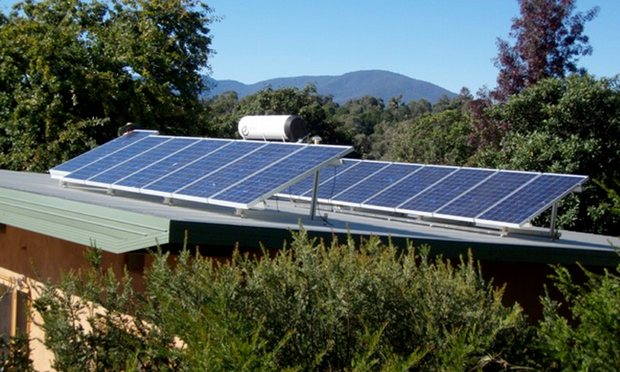In the absence of ambitious climate action by the federal government, communities are leading Australia in setting renewable energy targets

Communities and councils are filling the void left by the federal government on ambitious climate action. Many are frustrated by the government’s lack of progress on climate change and instead are getting on with the job themselves.
A survey conducted by Beyond Zero Emissions of 152 councils across Australia shows that almost one in five of the councils surveyed have set their own zero emissions or 100% renewable energy targets.
At the Australian Local Government National General Assembly in Canberra last week, councils passed several resolutions on climate change, including action on zero emissions, so momentum is clearly building in this area. One of the motions called for “the local government sector to partner with government and industry in innovative renewable energy and zero carbon solutions that will both reduce emissions and create new local jobs and industries”.
In some councils, work is already under way. Utilising the Zero Carbon Australia research from Beyond Zero Emissions, Byron Shire has committed to be Australia’s first zero-emissions regional area by 2025, covering energy, buildings, transport, land use and waste. Noosa council is also on the way to setting a zero-emissions goal, while other towns such as Moreland, Uralla, Yackandandah and Newstead are following with 100% renewable energy with either council or community leading. The Australian Capital Territory is on track to meet its target of 100% renewables by 2020 and both the Victorian and South Australian governments have set net zero emissions targets. But where is the federal government in all of this?
The survey we conducted covered councils across every state and territory, and represents more than 10m Australians. Policy uncertainty and no federal funding are key barriers identified by local governments that have removed the incentive for setting more ambitious local targets while federal and state support for increased local budgets, human resources and improved access to financing are all needed to enable communities to achieve zero emissions targets.
There is also a lack of significant collaboration at federal level to provide consistency on emissions reductions approaches. Communities and councils are instead partnering with other local councils or regional council alliances, NGOs and consultants. Barriers at the state/territory level also need to be removed and there are a range of regulatory and legislative barriers to households and businesses buying and selling and distributing renewable electricity to each other that need to be dismantled.
The targets set by councils and communities are certainly ambitious. Almost half (45%) of councils surveyed have set long-term emissions reduction goals with interim targets. In most cases these targets cover council operations but one in five councils are also including community emissions in their targets. The most common long-term council goal is a 20% reduction in emissions by 2020; the most common community-wide goal is zero net emissions by 2020.
While many councils and communities note the importance of addressing climate change risks and impacts, they can also see the business opportunities embedded in these goals. For instance, in Byron Shire, food, waste, energy and electric bicycle businesses are emerging as a result of the project. Some councils also note the enhanced liveability and social benefits along with the cost savings and economic benefits to their communities. Others are using the push to achieve wider sustainability goals and to be a leader in the region or on the world stage.
The major political parties may finally be realising they need to act. Last week the Coalition announced that they would allocate $100m a year to city councils to leverage clean energy and energy efficiency investments, even though once again the Coalition is taking funds from the Clean Energy Finance Corporation to fund election promises.
The Coalition announcement parallels Labor’s announcement of $98.7m to establish a community power network and regional hubs as part of its climate action plan and the Greens announcement of $265.2m for community-owned renewable energy.
But if the government is really serious about addressing climate change and meeting its emissions reduction goals, it should be assisting communities and local governments in whatever way it can. It should also remove the regulatory and legislative barriers that currently constrain distributed energy and prevent households and businesses from buying and selling renewable electricity amongst themselves. Both federal and state governments should show their support by developing a zero emissions plan, complete with a federally supported and nationwide local zero carbon communities program, immediately.
